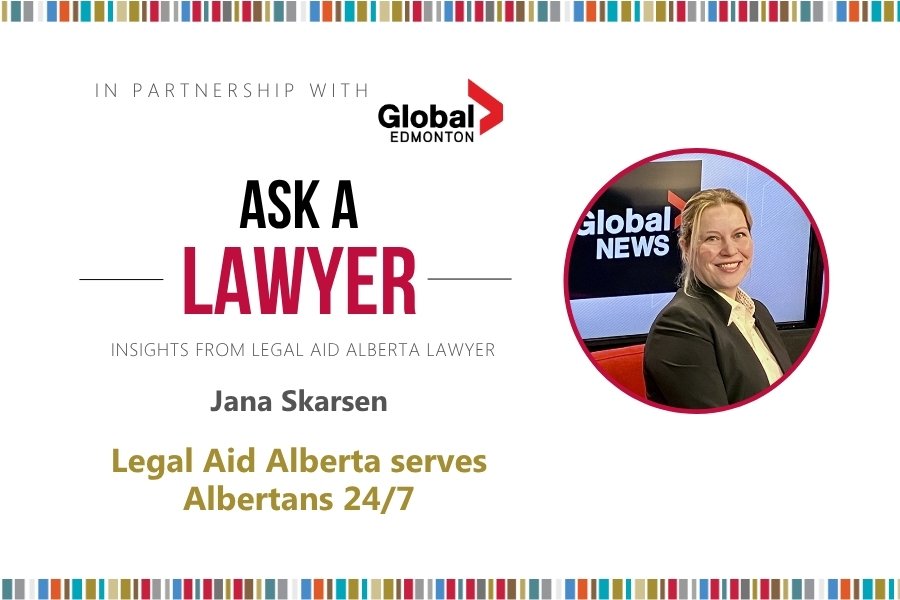Demand for Legal Aid Alberta never rests. Just as police work around the clock, Legal Aid Alberta lawyers are also on the job 24 hours a day to protect Albertan’ rights and ensure the Rule of Law is followed.
Legal Aid Alberta Staff Lawyer Jana Skarsen appeared on Global News Morning Edmonton to discuss how the Brydges phone line makes a difference for people who are under arrest or detained.
Watch the segment (transcript below)
Vinesh Pratap: When a person is arrested, their right to legal advice under the Charter of Rights and Freedoms has to be respected. Legal Aid Alberta lawyers work around the clock to protect that right. Here to tell us more about the Brydges phone line is Legal Aid Alberta staff lawyer Jana Skarsen. Jana, thank you so much for being here.
Jana Skarsen: Thanks for having me.
Pratap: So yeah, I was going over the copy here and the Brydges phone line – what is that all about?
Skarsen: When you’re detained or arrested in Canada you have a right to counsel. Your Charter right, section 10 under the Charter of Rights and Freedoms, is triggered and most people don’t have a lawyer on speed dial and at all times day or night they may not answer anyway. So Legal Aid Alberta provides a phone number to all Albertans, that the police give to people who are detained or arrested, totally free of charge. And whenever someone calls it a lawyer – an experienced criminal lawyer – answers the phone gives them advice, tells them what their rights are. We field about 25,000 calls a year, an average of 68 calls per day. It’s a very necessary service. We also provide that service in any language so if I’m on shift I’ll answer the phone but if the person on the other end doesn’t speak English I can have an interpreter on the line in under a minute.
Pratap: That is amazing! And so is the service available 24/7 or are there other specific hours?
Skarsen: 24/7, 365 days a year.
Pratap: OK alright so that is a pretty important and pretty significant. Talk to us about yes, lawyers are staffing it and are hearing from people in quite desperate situations you know, so playing part counselor as well. So how do you handle these emotions and the legalities that evolve whenever those initial phone calls are made.
Skarsen: It is a very stressful time for anyone who’s ever even been pulled over, you know that, so if you’re arrested and they’re under a lot of pressure so I always tell them let’s talk about that the police have a job to do, which I respect. They have their role in the justice system, and I have mine. And my job is to protect you, protect your rights and make sure you know what to expect and what you’re legally obligated to say and not to say.
Pratap: So, even though you would give them those instructions the conditions might be emotionally charged. Some, you know, incriminating information might go back and forth. How do you deal with situations like that then?
Skarsen: Well there’s something in law we call a spontaneous utterances so if you’re giving the police information that they’re not soliciting that might be admissible in court. they shouldn’t be asking you questions until you’ve spoken to a lawyer that’s generally the rule so if the police are interrogating you and you haven’t had your right to counsel generally that wouldn’t be admissible in court. There are exceptions. For example, if it’s a murder investigation and incriminating evidence is given and your charter rights have been breached the court might decided that that evidence is admissible because it’s in the public’s interest to solve a murder obviously. So it’s like like all questions in law the answer is “it depends”.
Pratap: OK each situation is individual I guess.
Skarsen: That’s right and then the police are just as anxious as anybody to have that phone call made because they aren’t able to continue their investigation and ask questions until you’ve had your right to council so they usually are pretty prompt and making sure that you get that phone call.
Pratap: So you mentioned kind of during the course of our conversation it’s police that people out of that number to the Brydges phone line but if a person decides that “OK I’m not gonna call them right away, I just kind of want to deal with this,” but then a week, a month down the road into the process they decide to give it a call. Is there a time our frame from when they can call the line or is it available at any point in the process?
Skarsen: No, our line is generally for people who have just been arrested or detained. Sometimes they’re at the airport, usually they’re in police custody so it’s not a general legal advice line it’s a number that is given to police so they can give the number when it’s appropriate. There’s no specific timeline for when you get your right to counsel it’s as soon as practical. So if you’re arrested say in rural areas with no cell service it might not be practical in the movement to make that phone call but the police are obligated to do it as soon as they can.
Pratap: OK and this is available throughout Alberta so any individual no matter where you are in this province right?
Skarsen: That’s correct. When I’m on shift, my eight-hour shift for example I’ll take an average of maybe 40 to sometimes 60 calls but it’s from all over Alberta.
Pratap: OK very interesting. Thank you for educating us on this very important service. I thank you again for coming in.
Skarsen: Yeah thank you – appreciate it.
Pratap: And Legal Aid Alberta lawyers, they specialize in family law, child welfare, domestic violence, immigration and youth and adult criminal defence. And if you have a question for a lawyer, you can send it to [email protected].


